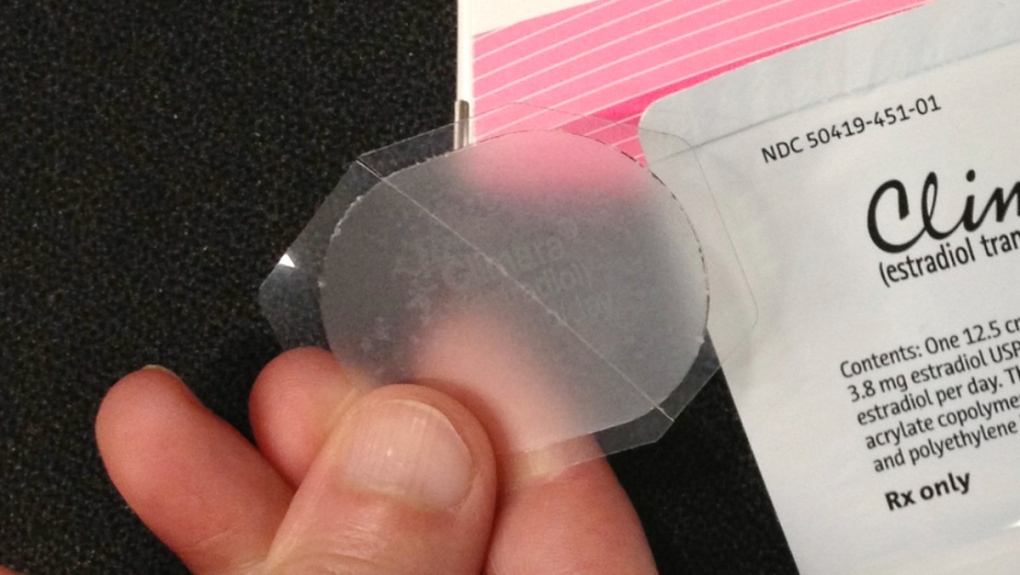
Deadly six-vehicle crash on Highway 400 sparked by road rage incident
One person was killed in a six-vehicle crash on Highway 400 in Innisfil Friday evening.
Women often use hormone therapy to relieve hot flashes and other menopause symptoms -- and new research suggests patches or creams may be safer for their blood pressure than pills.
As women's bodies produce lower levels of reproductive hormones during menopause their risk for heart disease rises. High blood pressure further increases that risk -- but it's not clear whether there's a link with hormone therapy for menopause symptoms.
Canadian researchers wondered if the way hormones are absorbed -- orally, vaginally or through the skin -- could play a role.
The University of Calgary team examined health records of more than 112,000 women ages 45 and older who filled prescriptions for at least six months' worth of estrogen-only hormone treatment between 2008 and 2019. They tracked which women went on to develop high blood pressure at least a year after starting treatment.
While the differences weren't huge, women who took estrogen pills had a 14% higher risk of developing hypertension compared to those using skin patches or creams, the researchers reported Monday. Oral estrogen carried a 19% greater risk than vaginal versions.
The findings were published in the journal Hypertension.
Hormone therapy has a mix of risks and benefits that mean it's not for everyone. Today it's prescribed not to prevent disease but to relieve menopause-related symptoms -- generally using the lowest possible dose for the shortest time. Most commonly used are combination pills of estrogen and another hormone, progestin. (Estrogen-only pills typically are prescribed to women without a uterus.)
Different versions of hormone therapy may work better for different menopause symptoms, something the study didn't address.
But it adds important clues to understanding the complex relationship between hormone therapy and blood pressure, said Dr. Garima Sharma, a women's heart specialist with Virginia's Inova Health System and the American Heart Association.
Sharma would like to see a more rigorous trial that compares different hormone versions. But she pointed to a possible biological explanation: Maybe oral estrogen affects enzymes linked to blood pressure as it's being processed, while skin and vaginal versions have much more limited activity in the body.
Still, "these findings are very clinically relevant," Sharma said in an an email, and suggest it's especially important to monitor blood pressure in women who use oral hormone therapy.
------
The Associated Press Health and Science Department receives support from the Howard Hughes Medical Institute's Science and Educational Media Group. The AP is solely responsible for all content

One person was killed in a six-vehicle crash on Highway 400 in Innisfil Friday evening.
The President of Poland says his country would 'of course' be interested in purchasing Canadian liquefied natural gas if it were available, while the Canadian federal government has said it is 'not interested' in subsidizing future projects.
A recent report sheds light on Canadians living abroad--estimated at around four million people in 2016—and the public policies that impact them.
An election-year roast of U.S. President Joe Biden before journalists, celebrities and politicians at the annual White House correspondents' dinner Saturday.
Ontario is now home to an invasive and toxic worm species that can grow up to three feet long and can be dangerous to small animals and pets.
Dozens of people raised their arms in the fascist salute and shouted a fascist chant during ceremonies Sunday to honor Italian dictator Benito Mussolini on the 79th anniversary of his execution.
Health Minister Mark Holland says while he is 'deeply appreciative' of the work doctors in Canada do, the federal government has no plans to scrap the proposed capital gains tax changes outlined in the latest budget, despite opposition from the Canadian Medical Association.
It's one thing to say you like Taylor Swift and her music, but don't blame CNN's AJ Willingham's when she says she just 'doesn't get' the global phenomenon.
Sophie Gregoire Trudeau says there is 'still so much love' between her and Prime Minister Justin Trudeau, as they navigate their post-separation relationship co-parenting their three children.

As if a 4-0 Edmonton Oilers lead in Game 1 of their playoff series with the Los Angeles Kings wasn't good enough, what was announced at Rogers Place during the next TV timeout nearly blew the roof off the downtown arena.
Mounties in Nanaimo, B.C., say two late-night revellers are lucky their allegedly drunken antics weren't reported to police after security cameras captured the men trying to steal a heavy sign from a downtown business.
A property tax bill is perplexing a small townhouse community in Fergus, Ont.
When identical twin sisters Kim and Michelle Krezonoski were invited to compete against some of the world’s most elite female runners at last week’s Boston Marathon, they were in disbelief.
The giant stone statues guarding the Lions Gate Bridge have been dressed in custom Vancouver Canucks jerseys as the NHL playoffs get underway.
A local Oilers fan is hoping to see his team cut through the postseason, so he can cut his hair.
A family from Laval, Que. is looking for answers... and their father's body. He died on vacation in Cuba and authorities sent someone else's body back to Canada.
A former educational assistant is calling attention to the rising violence in Alberta's classrooms.
The federal government says its plan to increase taxes on capital gains is aimed at wealthy Canadians to achieve “tax fairness.”
 A low-dose estrogen skin patch, seen in 2012. (AP)
A low-dose estrogen skin patch, seen in 2012. (AP)